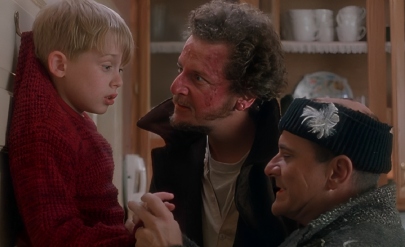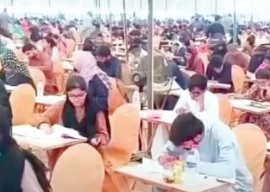
He had set three agendas for the session - the validity of the two-nation theory, was the division of provinces in 1947 justified and the marginalisation of Pakistani Hindus.
Once he was done with those details, he proceeded to introduce the speakers – former minister and historian Dr Hamida Khuhro, historian Yasmin Khan, Dr Syed Jaffer Ahmed, writer and translator Alok Bhalla and columnist Asif Noorani.
Dr Khuhro spoke first. She said that the two-nation theory was not valid and had never been valid. “Its proponents forgot that Hindus and Muslims had lived together for more than 1,300 years and had contributed to each other’s heritage,” she said. “How can you divide two nations when the line of division weren’t even clear in the first place.” She added that the theory was ‘untenable’.
Khuhro said that she didn’t see much marginalisation of Hindus in Pakistan. “As far as I have seen, the community has lived here for ages and are well settled,” she said. To this, Noorani quipped that they were only kidnapped sometimes. The audience made a sound that was something between a snigger and a chuckle. Khuhro immediately responded and said that they were kidnapped because of the law and order situation and because they were wealthy. She added that she couldn’t offer a definite opinion on the issue.
As the microphone was passed on to Khan, she said that she was fascinated by the process – the before and after of Partition which validated the Two-Nation Theory on both sides of the border. She reminded the audience that the first constituent assembly of Pakistan had a Dalit member. Minorities like the Parsis were kept from migrating to prevent the collapse of infrastructure like banking and education in Karachi.
Jaffer, who is the director of Pakistan Studies Centre at University of Karachi, thought that Jinnah only wanted to safeguard the interests of Muslims. He used the Two-Nation Theory as a political tool and was the first one to negate it in his speech of August 11, 1947.
Khuhro immediately responded that it was not Jinnah but Lala Rajpat Rai, an Indian author and freedom fighter, who was the first person to disagree with the theory. The leaders had embarked on a ‘religious project.’ “Pakistan needs to be declared a secular state,” he said. “We should accept, respect and enjoy the diversity and not suppress them.”
To this Bhalla added that he was glad someone spoke about secularism. “I did not want to say it myself because it would be a breach of hospitality,” he said. “India has problems with minorities too, but every time the government misbehaves, a large number of people were always there to protest. This is our saving grace.”
Bhalla was certain that literature from both sides of the border, before and after 1947, considered Partition inexplicable. He said that none of the writers thought that the differences were so great that they could not be bridged with dialogue. He added that it was reflected in post-1947 literature. “Not a single piece of literature described that the people felt like they had come home after migration,” he said. “Instead it is full of memories of what people left behind. The people didn’t go to their gurdwaras, mosques and temples to thank their gods for Partition.”
However, Noorani had a different story to tell. For him, Partition was a blessing because otherwise, his wife’s family would have stayed in Meerut and his family would have remained in Bombay and he wouldn’t have met his wife. “She would have been married to a Meeruti man,” he said. “Who knows I might have been married to a starlet who would have filed for divorce already.”
Published in The Express Tribune, February 13th, 2012.
COMMENTS (16)
Comments are moderated and generally will be posted if they are on-topic and not abusive.
For more information, please see our Comments FAQ



1730884134-0/BeFunky-collage-(26)1730884134-0-165x106.webp)













@Sikander:
Nehru did not agree to autonomous states and he took a right call...btw, why has pakistan not given autonomy to their member states...let it give autonomy to balochistan and see what happens ...Nehru had his weak points but he was a visionary too, much like Jinnah was.
We are thanking God now!
@Sikander: India would have broken up into plenty of small countries if it started off as a country full of autonomous states. What happened to Pakistan which was a much smaller area and with alot less diversity. Im not saying the Indian system is perfect and we are aware it has many flaws which Indians are trying to take care of.
Lets not get carried away by supporting Jinnah or criticising him. Face the facts, the concept of autonomous federating units just continued the feudal and warlord culture in Pakistan. It was imperative for India to be unified in this regard and all feudal states had to be abolished at a legislative level. Jinnah was forced to keep the muslim elites on his side and thats what forced him to create this plan of federating units. Indians and Pakistanis need to let bygones be bygones and not blindly follow whatever is fed to them. Look to the future and try to make amens instead of trying to pretend to have some sort of moral high ground on issues.
@Bangladeshi: So why did Bangladesh split from Pakistan? Was it offered more money by the "corrupt Hindus" ?
@Bangladeshi: " ... How can a muslim of S.Asia even think of going back to Hindu Dominion. Partition prevented a muslim Holocaust. ... "
How is Muslim dominion working out for you ?
These seculars are on RAW pay role and spearhead propagandas to achieve the Akhand Bharat dream. How can a muslim of S.Asia even think of going back to Hindu Dominion. Partition prevented a muslim Holocaust.
Great...why don't all the people at the literature festival show up in Rawalpindi and let them know that the 500,000 people that fight under the slogan "iman, taqwa, jihad fi sabilillah" can pack up and go home because these writers and artists have the defense of the nation covered. Hamida Khuhro can tackle the Kashmir jihad and Begum Nawazish Ali can be the rep to the Taliban. I wonder if the cannabis festival took place next door before they started this discussion group.....liberals seem to live in some lala land where they think they actually have a chance of doing more than giving a weak speech to a bunch of irrelevant artists about matters which are frankly far beyond their ability to comprehend. If you're so keen on the secular state and rejoining India...just migrate there now and save everybody the useless debate on an issue that's been long buried. If anybody in Pakistan took you seriously, you'd be discussing this subject somewhere other than a literary festival.
@Yuri Kondratyuk: Wrong.. this was the best possible solution which would have yielded a powerful sub-continental federation. Only reason it was rejected by congress was that it would have decreased their own influence. So, it was there greed to hold on to power that resulted in division of subcontinent. Experts on both sides of the border now accept this fact. "Jinnah’s plan of perpetual meddling and chaos" speaks volumes about your close mindedness and your lack of knowledge about The Great Muhammd Ali Jinnah.
Partition was the best thing to happen to British India and India of today. Thank you Mr Jinnah. Thank you Mr Nehru and Mr Patel to have the fore sight to see that the political religious poison that Jinnah's demand for a state based on religion had unleashed , was almost impossible to put back in the bottle. All I desire is that the JuD and LeT and Ajmal Kasab stay in the land meant for them and do not cross the border.
@Huma Shah: Agreed- more tired talk about partition. Pakistanis mostly want nothing to do with India except for a minority of Indian migrants in Karachi who have family in India and have some nostalgia. The majority of Pakistanis, especially native Paksitanis are thankful we have our own nation, challenges and all!
@Sikander:
Autonomous states that were weak, ready and ripe for any country to meddle freely. Not to mention the possibility of constant meddling by muslim states. No thanks! Sardar Patel was wise enough to see through Jinnah's plan of perpetual meddling and chaos.
thank u grace, as for the rest, get over it! im a pakistani and im cool with the partition.
@Syed Arbab Ahmed: I don't know about you folks but I don't care about yesterday's history. I don't want Pakistan to be be together with India any more than Sri Lanka or Burma because our history and people are different. These people who want to argue about colonial India and such are living in the past and will be gone soon enough. Pakistan and the nations of South Asia are a reality and it reflects the wish of Pakistanis like me. I am a native Pakistani by the way.
Partition would not have been necessary if Nehro had accepted the plan for autonomous states. He only did so to ensure his seat and marginalize Muslims because if that plan had gone through, Muslim states would have been numerous and surrounding the only Hindu Majority state in the middle. Muslims would have had the right to self governance in combined India and they would have had more say in the affairs of the federation. It was Nehro's selfish desire for throne that lead Jinnah to keep pursuing a separate country. Now the lines have been drawn.. and they will not be erased. No use questioning the two nation theory now.
Before pakistan all muslims & hindus lived peacfully. Its was british rule, which used its divide & rule policy & created to elephants fight in which jinnah created fire in muslims heart & created pakistan to give his supporters a permanent Place to live free. Punjabi's then stopd the panhagir getting in punjab.but sindhi wel comed them with open arms saying they are our Muslim brother (panhagir). They gave homes, & place in heart. Now they are in karachi, hyderabad & think its then own land, & destroying the 5,000 years cultural heritage & language of sindh. Asking to create it theis own state.